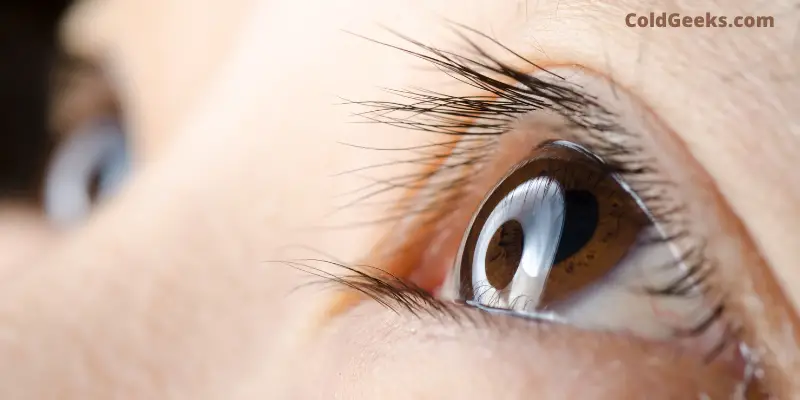I’ve battled sensitive eyes all my life. Every winter, I struggle with dry eyes. On cold days, my eyes can also get watery right in the corners.
Why do my eyes water on cold days?
Your eyes water on cold days because the dry air causes your tears to rapidly evaporate and your blood vessels to constrict. In response, your tear glands automatically produce more tears to keep your eyes lubricated and healthy. Watery eyes are normal and do not usually indicate an eye problem.
In this article, you’ll learn everything you need to know about why your eyes water on cold days.
Why Do My Eyes Water on Cold Days? (Full Explanation)

When the temperature outside plummets, you may notice that your eyes start to water.
This is a common condition known as cold-induced tears, and there are several reasons why it occurs. For one thing, cold air is often dry air, and when the air temperature drops, the humidity level also drops.
This can lead to dryness and irritation of the eye surface, triggering a reflexive response from the tear glands.
In addition, cold air can cause the blood vessels in the eyes to constrict. As the vessels constrict, they become more sensitive to irritants, which can also cause tears to be secreted.
Finally, windy conditions can also play a role in cold-induced tears by blowing irritants into the eyes.
Whatever the cause, if you find yourself shedding tears on a cold day, know that you’re not alone.
Is It Bad That My Eyes Water in the Cold?
No, it’s usually not bad that your eyes water in the cold.
In fact, it can be quite a good thing. When it’s cold outside, the air is generally drier than it is during other seasons.
This dry air can cause the tear ducts in your eyes to produce more tears. Tears are important for keeping your eyes lubricated and comfortable.
Without enough tears, your eyes can start to feel dry, irritated, and sore.
The tear ducts are also sensitive to temperature changes. So when it’s cold outside, they may react by producing more tears in an effort to lubricate the eye. However, this increase in tear production can sometimes be more than the eye can handle.
As a result, the excess tears can overflow and cause your eyes to water.
In most cases, watering eyes in the cold are nothing to worry about. It’s simply a reaction to the dry, cold air.
However, if your eyes are watering excessively, it’s never a bad idea to check with an eye doctor.
Is It Normal For Eyes To Get Watery In the Cold?
It’s perfectly normal for eyes to water in the cold.
In fact, it’s a very common phenomenon that happens to a lot of people. Especially people who spend more time outside in cold weather.
And especially in areas with:
- Very cold temperatures
- Windy weather
- Dust
- Allergies/pollens
All of these factors can increase watery eyes in just about anyone. Combined, they can result in a waterfall from your eyes.
How To Stop Eyes From Watering in the Cold
The good news is that there are several practical steps you can take to prevent your eyes from watering in the cold.
Let’s look at 6 ways that work for me and my family.
Wear Eye Protection
Wearing sunglasses or other eye protection can help prevent your eyes from watering in the cold.
Cold wind can irritate the surface of your eyes, causing them to water. Sunglasses or goggles create a barrier between your eyes and the cold air.
When you wear them, your eyes aren’t as exposed to the elements, and they’re less likely to tear up.
Sunglasses also help to keep the sun out of your eyes.
If you spend time outdoors in the cold, windy weather, make sure to pack a pair of sunglasses in your bag. You’ll be glad you did when everyone else’s eyes start tearing up from the cold.
Blink More Often
One way to help prevent watering eyes in the cold is to blink more often.
Blinking helps to spread tears over the surface of the eye, keeping it moist and healthy. As silly as it sounds, when you’re out in the cold, don’t forget to blink.
Use Artificial Tears
To help combat watery eyes, people often turn to artificial tears or eye drops.
Artificial tears are a great option for those who have milder symptoms. They can help to add moisture to the eye and make it feel more comfortable.
This prevents your eyes from drying out and your eye ducts from automatically producing excess tears.
All in all, using artificial tears or eye drops is a simple way to help prevent your eyes from watering in the cold. Just be sure to follow the instructions on the packaging and consult with your doctor if you have any questions.
Take More Indoor Breaks
When it’s cold outside and you’ve been out in the elements for a while, your eyes may start to water as a way to protect themselves from the colder temperatures.
One way to help prevent this from happening is to take frequent breaks indoors where it is warmer.
This will give your eyes a chance to adjust to the change in temperature and help reduce the risk of them watering. Additionally, limit your time outdoors in the cold by staying inside as much as possible.
Avoid Extreme Cold Weather
If possible, try to avoid spending time working, living, or playing in extremely cold temperatures.
Of course, this is easier said than done.
Not everyone can pack up and move states because of watering eyes. However, if you can make any changes to reduce your time in a wintery wasteland, your eyes will thank you.
Use a Humidifier
Using a humidifier can help to prevent this problem by keeping the air moist.
This can help to reduce irritation and inflammation of the eye tissue, as well as prevent the evaporation of tears. In addition, a humidifier can also help to soothe dry, itchy skin and relieve congestion.
Here is a good humidifier for watery eyes:
Avoid Any Type of Smoke
Cigarette smoke is also a common irritant that can cause watery eyes.
In addition to causing irritation, cigarette smoke can also contribute to dryness by making the tears evaporate more quickly.
Smoke from fires and other sources can also have the same effect. To help prevent watery eyes in the cold, avoid exposure to cigarette smoke and other sources of smoke.
Don’t Blow Fans Directly Into Your Face
One way to help prevent this is to avoid blowing fans or heaters directly in your face.
The warm air or wind can speed up the evaporation of your tears, making the problem even worse. Instead, try pointing the fan or heater at the floor or ceiling so that the air circulates without blowing directly in your face.
Reduce Contact Time
If you find that your eyes are watering more than normal in the cold weather, it might be time to take a break from wearing contacts.
Prolonged exposure to low temperatures can cause the blood vessels in your eyes to constrict, which can lead to watery eyes.
Wearing glasses will help to protect your eyes from the cold and will also allow your eyes to rest.
If you don’t want to give up wearing contacts altogether, consider switching to daily disposable lenses, which you can discard after each use.
You should also make sure to clean your lenses regularly with a sterile solution to prevent infections.
By taking a few simple precautions, you can help keep your eyes healthy and comfortable all winter long.
Here is a good video about how to stop watery eyes:
Why Do My Eyes Water When I Have a Cold?
If you’ve ever had a cold, you may have noticed your eyes watering more than usual. But why does this happen?
There are a few reasons.
First, when you have a cold, your nose produces more mucus than usual. This excess mucus can clog up your tear ducts. Secondly, cold viruses cause the blood vessels in and around your eyes to swell.
This swelling can lead to increased pressure in the eye, which can cause tears to form.
Finally, coughing and sneezing can also lead to watering eyes, as they can force air and other irritants into the eye.
Why Do My Eyes Water When I Run?
Wind, cold weather, dry eyes in the heat: all of these can cause your eyes to water when you run.
But why does this happen? Let’s take a closer look.
Windy conditions can cause your eyes to water because of the increased air flow. This can affect both recreational runners and competitive athletes alike.
In fact, many marathon runners wear sunglasses to help protect their eyes from the wind.
Many runners run in the cold. As we’ve seen, cold weather can also cause your eyes to water. Dry eyes are also a common problem in the heat, especially for those who live in hot and humid climates.
When it’s hot outside, the air is often filled with dusty or sandy particles. These particles can dry out your tears, leading to irritation and watering.
If you find yourself tearing up on your next run, don’t worry – it’s just nature working against you!
But remember, there are easy ways to protect your eyes from the elements.
Final Thoughts: Why Do My Eyes Water on Cold Days?
The bottom line is that your eyes water in the cold because of your body’s natural defense mechanisms.
Nature might be against you but your body is protecting you.
Related posts:
- Why Does Gum Make Water Cold? (Solved & Explained)
- How Cold Is CoolSculpting? (Solved & Explained)
- What Is Cold Laser Lipo? (Explained for Beginners)

